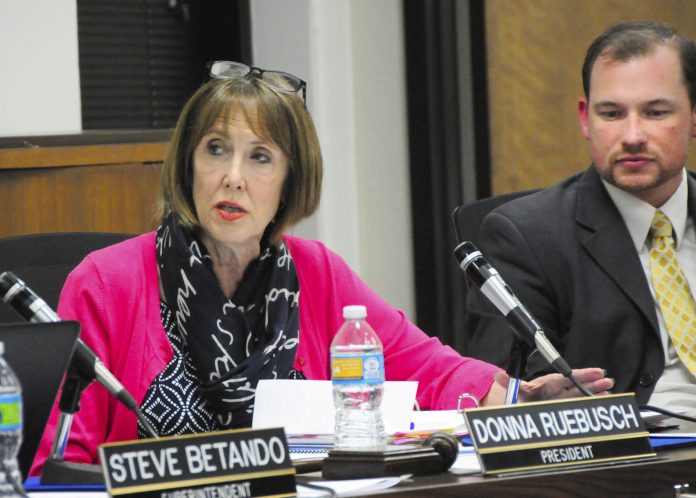
Despite Morgan Hill Unified’s board of education supporting Charter School of Morgan Hill in its application for state rehabilitation funds, local school district leaders refuse to give the charter a passing grade necessary for them to qualify for the $11.5 million request.
In doing so, the California School Finance Authority rejected the independent charter school’s application because the charter was not “in good standing with its authorizer” and, therefore, “not financially sound for a program award,” according to the state agency in charge.
At stake is the funding for a modernization and upgrade project—identified by both the charter school and the Morgan Hill district as a crucial need—at the campus north of Morgan Hill, which is owned by the district.
In a Sept. 26 letter to the state finance authority, Morgan Hill Assistant Supt. Kirsten Perez charged the charter school with not complying with the conditions of its petition—most notably not submitting adequate financial statements—and failing to sign a Memorandum of Understanding with the authorizing district, among other things.
“Although CSMH continues to operate in the district, it has failed to meet many of the criteria outlined in its original petition, (and) failed to meet many of the stipulations under which the petition was renewed,” wrote Perez in her correspondence to Linda Sawin of the state finance authority.
With a potential $11.5 million in Proposition 51 funding on the line, charter school director Paige Cisewski has not given up hope and has since appealed to the Morgan Hill school board, which granted the local charter permission five months ago to move forward with the application process.
Cisewski is requesting that the district either withdraw its Sept. 26 letter to the state or pass a resolution at its Nov. 7 meeting “regarding good standing and compliance with the terms of the charter” so they can still be considered for the grant money. They have until Nov. 15 to make that happen.
“The district administration’s verbal and written communications to CSFA lacks any factual basis and appears to be nothing more than an attempt to undermine CSMH’s Prop. 51 application and to circumvent the decision and intent of the majority of the Board of Trustees,” wrote Cisewski in her Oct. 26 letter to Morgan Hill school trustees.
Morgan Hill Board President Donna Ruebusch has kept tabs on the situation since the trustees gave CSMH the ability to pursue the grant money. However, Ruebusch said the charter school has failed to file its financial report with the district office.
“From what I understand, the district has not received that document in the format necessary for the district to say, ‘We know that they are financially secure,’” Ruebusch said.
Board majority supports CSMH application
Prop. 51, which allows for $9 billion in public school facilities bonds, was passed by voters in November 2016 and a portion of those funds were set aside solely for public charter schools. In its application, the Morgan Hill charter school requested financing for an $11,577,416 project with half coming from Prop 51 and half via a matching loan from the state. The project includes modernization of four restrooms and nine permanent classrooms as well as modernization or replacement of 11 portable classrooms, according to a May 16 district report.
“It is frustrating and confusing to understand why the district administration appears to be doing everything in their power to thwart our attempt to apply for Proposition 51 funding,” Cisewski said.
In May, the Morgan Hill school board voted 5–2 to approve the application authorization, which went against the school district administration’s recommendation.
Trustees Gino Borgioli, David Gerard, Teresa Murillo, Mary Patterson and Vice President Tom Arnett voted in favor of the charter school’s request, while Ruebusch and Ron Woolf were against it. As part of the application process, a charter school must gain permission from its authorizer to be eligible.
At that time, the district was worried about losing full control over future considerations for the charter school’s Encinal site (9530 Monterey Road), if the state funds were used for facility upgrades. The school district also is concerned about the risk of having to take on the remainder of the state loan portion if the charter school somehow closed or moved.
Since then, Cisewski said the district tried to delay the application process when Morgan Hill School Superintendent Steve Betando “would not sign the Office of Public School Construction document indicating that the district supported our submission of an application.”
CSMH not in compliance?
The charter school, which would have learned in January 2018 if they received any or all of its grant request, is now in limbo over whether they are still being considered for the funds, Cisewski said. She also cited the district’s $700 million Facilities Master Plan, which outlines a wish list of upgrades and renovations needed at existing Morgan Hill schools as well as new construction of future schools.
“They need hundreds of millions of dollars in renovations, so you would think that wherever anybody can find money, they should be going after it,” Cisewski said.
Instead, Perez, in her letter to the state financing authority, outlined the charter school’s failure to address conditions attached to its petition, including deficit spending, month-by-month cash flow projections, distribution of “common and fair data” on state test scores and implementation of a weighted lottery enrollment system that gives “a 2-to-1 preference to socioeconomically disadvantaged students.”
Cisewski said her charter school staff had addressed each of the conditions attached to their five-year renewal petition. Her staff sent those clarifications to the district as part of the annual report, according to Cisewski.
Ruebusch also thought the annual report presentation at the Oct. 17 meeting would have cleared up any lingering questions regarding the charter school’s compliance, but said she was disappointed with the absence of any facts and figures. Instead, the charter school chose to give a presentation on its agricultural science program.
Ruebusch wanted to know if the charter was still operating at a deficit, and what corrective measures it was taking to improve its financial condition.
The charter school recently received $5 million in Measure G funds from the school district to build its new constructed multi-purpose facility.







